'The pride of the devoted Seinfeld fan is that he happens to love a show that doesn't take his love for granted, so that even on repeat viewings he is never really sure what directions an episode might take,' observes Sreehari Nair.
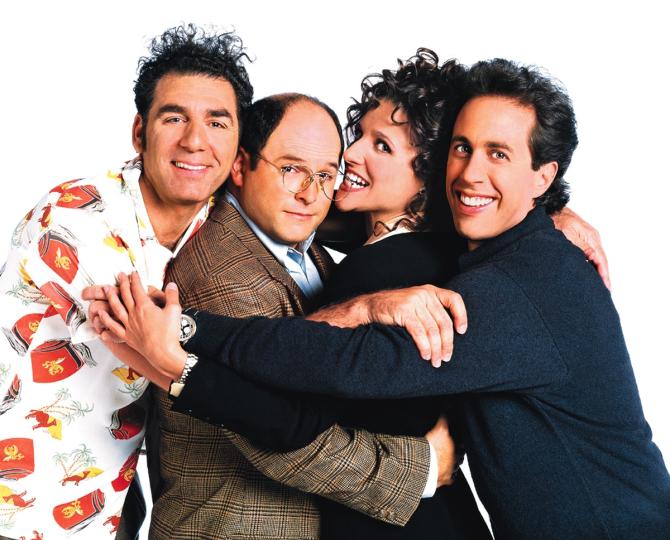
On July 5, 1989, Seinfeld debuted in the US. Created by Larry David and Jerry Seinfeld, it ran for nine series.
We fans of Seinfeld do not get rattled when some bloke or dame spouts something of the order of, 'Isn't Friends the greatest sitcom ever?' We never debate a claim like that, we are too at peace to debate -- so we flash a lopsided grin, we tilt our heads back slightly, we sigh.
We Seinfeld fans, you see, are extremely pleased in our private cathedral: If our legion doesn't interest you, we totally understand.
Perhaps you are not ready to take the plunge yet, or perhaps your tastes need some serious overhauling; either way, we promise not to judge you too acutely, and if we are feeling especially generous, we might even wish you well.
A pride of this kind, one that very often spills over into smug superiority, a snarky view just short of elitism, has to be Seinfeld's biggest gift to its fans. And this attitude of the fans makes perfect sense when you consider that Seinfeld was born out of two men standing consciously apart from the rubble of established sitcoms and their stock formulas, standing apart, pointing to the rubble, and declaring, 'We'd rather fail than settle for such conventional success.'
The suited executives at NBC had strong opinions about what the show should be and how it should behave. But neither Jerry Seinfeld, the mild-mannered stand-up comedian, nor his foul-mouthed co-conspirator, the balding, testy, monarch of unproduced sketches, Larry David, was up for behaving well.
Jason Alexander (who played George Costanza) once described a typical working week at Seinfeld thus: 'There would be a table reading of the script, NBC would then give its notes, Larry would quit, the prying NBC executives would be diminished, and Larry's ideas would be reinstated.'
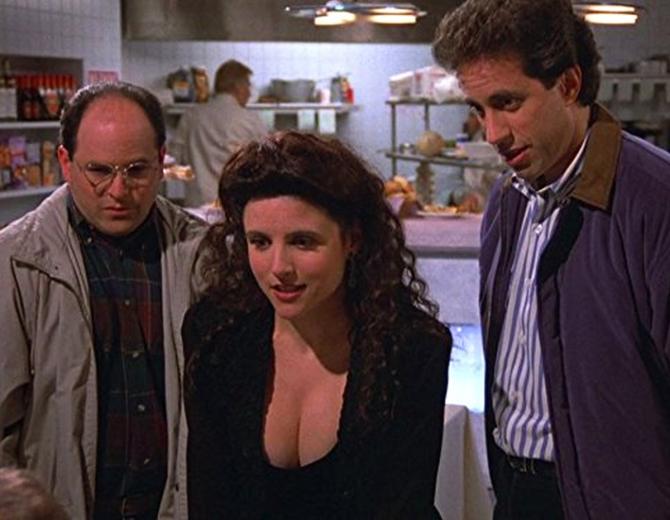
Over the nine years of its run, the creators of Seinfeld defied network notes, research reports and sitcom rulebooks through a systematic application of the 'love us or leave us alone' approach; and since the show's final episode in 1998, we rabid fans have been equally indifferent to the spreading of the Seinfeld creed.
In a sense, we happen to be such helpless, hapless apostles because we intuitively recognise that Seinfeld is not for everyone -- what's more, unless your brain is wired a certain way, it's not even an acquired taste.
Let me also add that labelling the show using such qualifiers as 'very funny' or 'awfully witty' or 'rip-roaringly hilarious' doesn't quite do it.
In point of fact, there's no other way to describe Seinfeld's humour except as... positively and thorough goingly Seinfeldian. And while there may be many shades and subtle variations of the Seinfeldian humour, on the whole, it comes out of a preternatural belief that all sincerity can be transmuted into irony.
For an illustration of what I am saying, let us cast a glancing look at episode number 18 of Season 4, in which -- surprise, surprise -- Mahatma Gandhi makes a very special appearance.
In this episode, which has Elaine, George, Kramer, and Jerry committing their assaults upon the geriatric community, an elderly woman winds up talking about her affair with a certain 'Mohandas'.
'Oh, the passion! The forbidden pleasure! He used to dip his bald head in oil and rub it all over my body,' she reminisces in a tremulous voice, just before her unsteady hand produces a black-and-white photograph which confirms the dalliance.
Since I have a wormy curiosity for history's great men and women, and because I constantly wonder about what they were up to when they were not doing those great things that we readily associate with them, the Gandhi cameo struck me as an instance of bravura comic marksmanship.
But the scene also works superbly as an index to a specific shade of the Seinfeldian humour, one that I like to call 'erudition casually tossed off.'
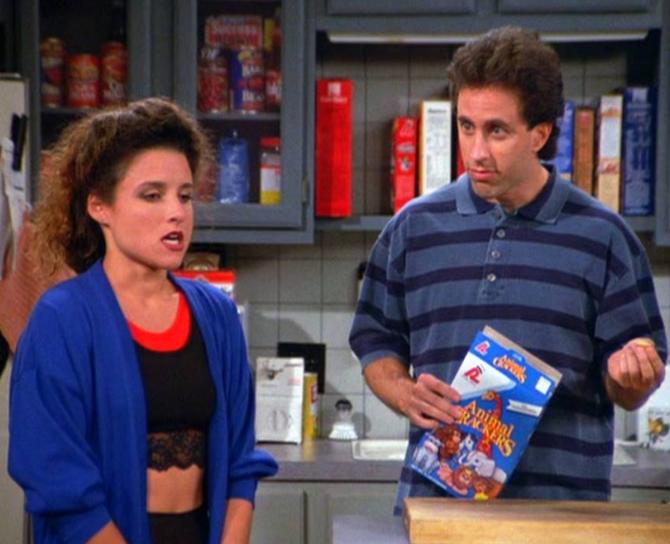
Getting a Salman Rushdie doppelganger to visit a New York health club, at the height of the fatwa years, no less; creating a comic routine out of the Third Tenor, whose obscurity is owed to his name not having a memorable ring to it, such as Pavarotti or Domingo; turning John F Kennedy's famous 'Ich bin ein Berliner' speech (a classic anti-Communist diatribe) into 'Ich bin ein sucker' (a paragon of verbal self-flagellation) -- yes, the model Seinfeld writer is, to put it plainly, a polymath who grew up to be a Dadaist gagster!
Only in Seinfeld can characters enter into a coffee shop argument about explorers: Was Magellan, who went around the world, the greatest explorer, or was it Desoto, who indulged in the more parochial adventure of discovering the Mississippi?
Only in Seinfeld can two loonies become unwitting witnesses to high literary gossip: In The Cheever Letters (not The Contest, not The Soup Nazi, this episode of soft interlockings and unexpected whams is, to my mind, peak Seinfeld), Jerry and George learn that George's girlfriend's pedantic father had had a passionate affair with the Chekhov of the suburbs, John Cheever.
Has there ever been another show that has deliberated on such subjects as Tolstoy's connection to Rhythm & Blues and Jacqueline Onassis' impossibly sibilant last name?
When George Costanza, that genius toad, has to convince an on-and-off mate that they can make it as a couple, despite their having nothing in common, he hurls at her the example of Louis Pasteur and his wife: 'She didn't know about Pasteurization. He didn't know about Fumigation. But they made it work!'
Elsewhere, when George isn't sticking pins into renowned scientists, he ponders the toilet paper situation during the American Civil War.
Sure, the model Seinfeld writer has read deeply and has wide-ranging interests, but there's also the question of palatability: How does he protect himself against charges of pretentious babble or, at the very least, laboured jokes? That, I believe, is achieved through working inside a larger artistic ideology; it is a matter of precise modulation, of knowing when to open the trapdoor.
In Seinfeld, every high-flown reference is used to illuminate something down-home or fleshy or vital or desperate, and brushes with history, philosophy, art, and science quickly descend into riffs on popular culture and consumerism, into B-movie dissections, comic book citations, and brand names of mass-produced items.
This shifting, this sliding, this inducing of sudden dizziness in the dedicated fan, is a critical shade of the Seinfeldian humour, and perhaps the very essence of its art. The show uses digression as Vermeer used light.
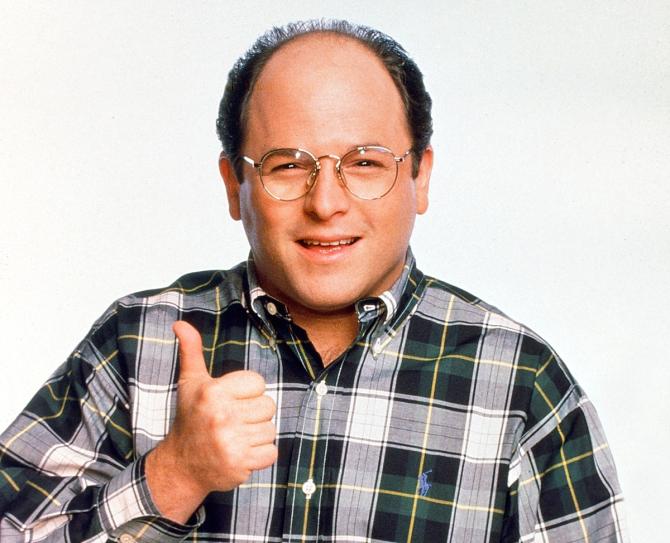
Larry David and Jerry Seinfeld wanted to experiment with a new style of television comedy, one in which seemingly solemn situations get displaced by banal, everyday considerations. And because the characters in Seinfeld had wholesome access to such moments of irrational insight, they never became victims of their own cutesiness, or, sitcom stereotypes.
So Kramer was not your average nut-job but an embodiment of the visionary as an early reactionary, and walk-on characters ceased to be mere fillers -- face to face with abrupt changes in tone, they would turn themselves into masterpieces of comic disillusionment.
Consider, for instance, the Bubble Boy's father: A Yoo-Hoo Truck driving, doughy sort of fellow, who sniffles as he speaks to Elaine and Jerry about his sickly son, forever doomed to live in a bubble with only a TV remote for company.
'So you have no control over the remote?' inquires Jerry, putting on his sociologist's monocle, and it causes the father to stop sniffling, reflect on his own condition, and admit, 'No, it's frustrating.'
Then there's Babu Bhatt's scraggly-looking brother, unnamed, but as evocative as a bottled butterfly or graveyard smoke.
After Babu Bhatt is deported, the brother stands on Jerry's doorway with all his Pakistani heritage and cries, 'Where is Babu?', and in that same exasperating breath he turns down an offer for Snapple because -- 'too fruity'.
All this is doubtless idiosyncratic; but you have to remember that a good part of the Seinfeldian humour has to do with a comedian putting his idiosyncrasies under the microscope or him batting for his idiosyncrasies with such gusto that they become funny.
Alternately, the Seinfeldian humour stems from a comedian's struggle to hold on to his individuality in a world that increasingly wants him to think generic, sterile thoughts.
In an initial episode set around a family dinner, Jerry blurts out a wisecrack about kids who own ponies ('hate them!') and ends up upsetting an old Polish immigrant.
'When I was a little girl in Poland, we all had ponies. My sister had pony; my cousin had pony. So, what's wrong with that?' she protests, her miffed voice carrying echoes of Hitler and the flight from Nazis as well as an ode to an idyllic world that no longer exists.
'After the old lady stalks out in a huff, Jerry turns to an unappreciative dinner crowd and asks, 'How was I to know she had a pony? Who leaves a country packed with ponies to come to a non-pony country?'
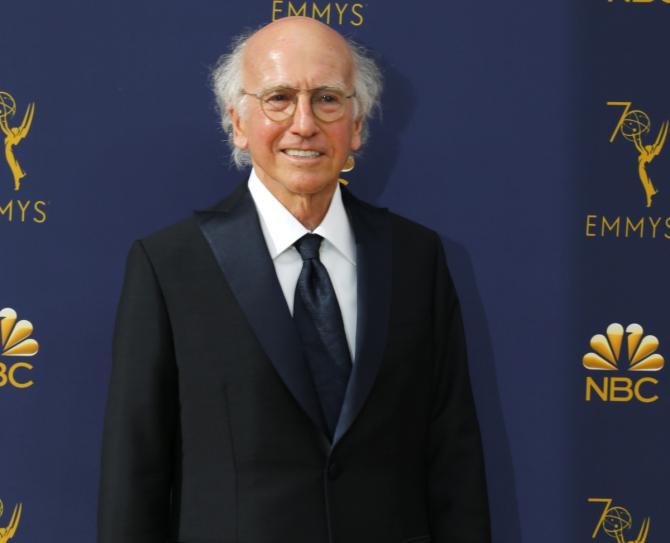
The comedian at the centre of Seinfeld is as single-minded as any serious artist, and this is his credo: 'I make prickly observations, pass acid judgements, and there's within me a bone or two of prejudice; but they are peculiar to me, and I want to see how far I can go without forswearing them.'
And the comedian's credo is modified into his friends' comic stubbornness: into George's tenacious kvetching; into Elaine's ultra-fine standards for everything from birth control to punctuation marks; into Kramer's insistence on walking the way he wants to walk.
When the show became a rage and its each pronouncement a hallowed pearl, the writing team was emboldened to go further than before -- and in the later seasons, you can see the idiosyncrasies of the comedic mind being presented in their bare forms.
An episode in Season 8 has an entire storyline stitched out of the following whimsical assumption: A girl who manages to be lively and open-hearted while also being exceptionally beautiful -- there must be something the matter with such a girl.
Bob and Cedric, the roadside thieves in The Soup Nazi, are conceived as homosexuals so as to sustain Larry David's theory that only gay guys would steal an armoire.
Though the craft of the show could very well be defined as 'Larry David's wonderfully weird eyes evoked in Jerry Seinfeld's immortal voice,' those eyes were not always received favourably on the Seinfeld set.
As a matter of fact, before Larry had the freedom to furnish Seinfeld his way, he was an untested virtuoso trying hard to convince the executives at NBC that his wretched life experiences could make for interesting sitcom plots.
Yes, it was Larry, the horny Jew, who was caught having intercourse with the cleaning lady in his office; it was Larry who had angrily resigned on a Friday and then attended work the next Monday as if nothing had happened; it was Larry who had had dinner alone with a girlfriend's high-profile father (the novelist Richard Yates), a man whose ghoulishness, it was said, could make ice-cubes in your glass clatter with trepidation.
But the NBC executives weren't convinced. And because Larry and Jerry weren't ready to cede ground, the early episodes were shot on astonishingly low budgets. And this limitation may have given birth to that shade of the Seinfeldian humour that is essentially an endorsement of the handmade look, a beacon for the indie spirit.
Think about it: Isn't Jerry's apartment way too small for a sitcom that went over so big? (It's practically a struggling artist's quarter).
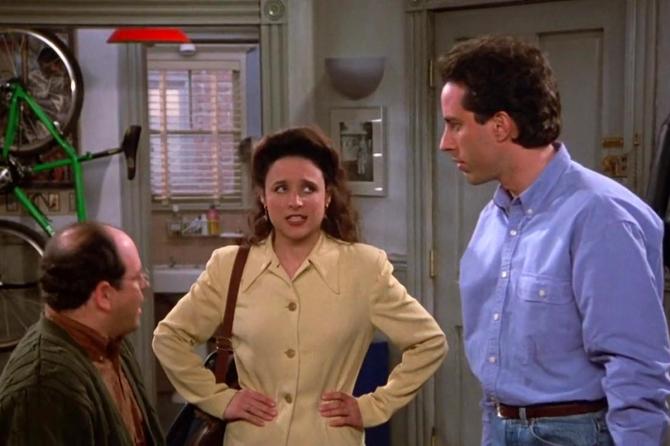
If you were to go by just their texture, the episodes in Seasons 1 to 4 resemble less the episodes of a sitcom and they are more like televised mini-plays -- complete with sets designed at heroically cheap prices (the Subway was a set; as was the Parking Garage), phony process shots, and some marvellous demonstrations of stagecraft on primetime (The ingenious use of blocking in something like The Dog,where we don't see the dog at all,is what gives that episode its brisk yet unassuming wit).
It is to the makers' credit that even at the height of Seinfeld's popularity they never quite got over their distrust of grandness and their affection for the grainy, the loose, the unpolished.
Even when they had carte blanche on the budget, the makers approached the excesses of production with their tongues firmly in their cheeks.
The appearance of an overly decorated elephant in The Betrayal (Season 9) feels so flippant and, dare I say, kitschy, that it becomes rapturous.
In Season 8's The Pothole, Elaine, Jerry, Kramer, and George meet in a janitor's closet to discuss their individual predicaments, and away from such contraptions as the Hamptons (too sunny), India (too exotic) and Burma (too clammy), the four sinners seem genuinely at home in that tiny space crammed with office supplies, paint thinners and piled-up bric-a-brac.
A visible desire to remain an intimate show, when everything in the natural order of things suggested a need for expansion, for puffing up, is proof that Seinfeld's elitism is not the elitism of high school snoot-hearts but that of great oppositional artists. And the oppositional stance it maintained right until the final fade-out of its final frame is why fans of Seinfeld still cannot slip into an episode like a warm bath or let it go down like comfort food.
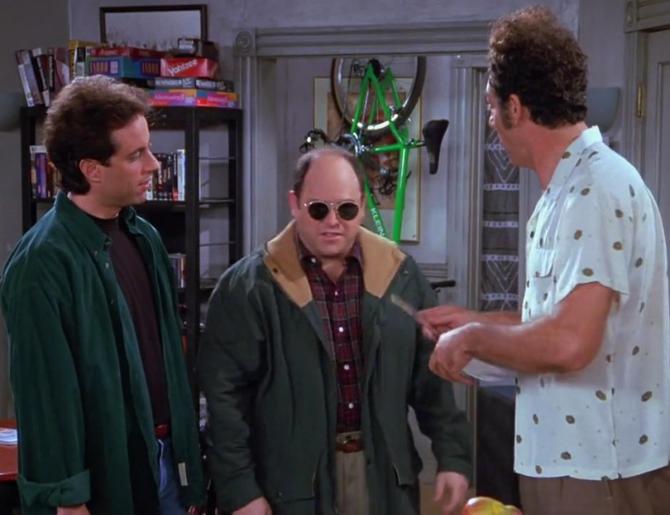
Though the show may have garnered more love than was healthy, Seinfeld never deviated from its default setting, which was a kind of refined antagonism.
Never once, through its period of elevated status, did it renounce its belief that success should produce in the ambitious artist a willingness to risk failure.
Does this explain Jerry, Kramer, Elaine, and George, who start out as miscreants but miscreants of reason and proportion, finishing up as fierce defenders of their zany terrains, finishing up as such menaces that it is decreed that they be confined, locked away, removed from society?
Were those lunges at surrealism, the movement toward convoluted plotlines and aggressive dovetailing, so salient in Seasons 6 to 9, were those changes in structure, pacing, and hue Jerry & Co.'s pushbacks against the network's demand for scale?
These are boardroom topics about which we can only make educated surmises, but one thing is definite: More important than its relationship to the critics and their freeze-dried ratings, more important than its relationship to the Emmys and their mercantile glitter, more important than its relationship to the moneybags that financed it or the fans who raised it to the level of a cultural phenomenon, was Seinfeld's relationship to the English language. And this shade of the Seinfeldian humour is the one that's most vigorously pursued through the nine seasons.
Not even in the works of Paddy Chayefsky or David Mamet or the Coen Brothers or Quentin Tarantino have characters played such fluid games with the English language.
Let us dispense with for once Yada Yada Yada, No Soup for You, Close Talker, Low Talker, Double Dipping, Master of My Domain, and that Teri Hatcher special that she delivers with a toss of her head and an evidently confident chest: 'They are real, and they are spectacular!'
Let us pay off with a friendly nod all those catchphrases, worn out by overuse, and pay our homage to others that didn't catch on to the extent that they should have.
How about that time when Kramer takes Jerry to task for harbouring a medical bias? In a moment that can only be dubbed as Nuremberg for Dentists, Kramer points a finger at his bountiful neighbour and declares, 'You are an Anti-Dentite!'
When Jerry has to convey to a date how excited he was at a certain point in his life, he tells her, 'Oh I had just come from shopping for a speedboat' -- an expression that seems straight out of a Fitzgerald novel about the melancholies of social climbing.
The slightly Nabokovian 'Mano a Baldo'; the obviously William Golding-ian 'It's all just slipping away'; a celebrated Merchant of Venice epigram transformed, in one swift motion, into a defence of nose-picking, as in: 'If we pick, do we not bleed?' -- yes, a model Seinfeld writer is fated to look for comic possibilities inside literary achievements of the first order.
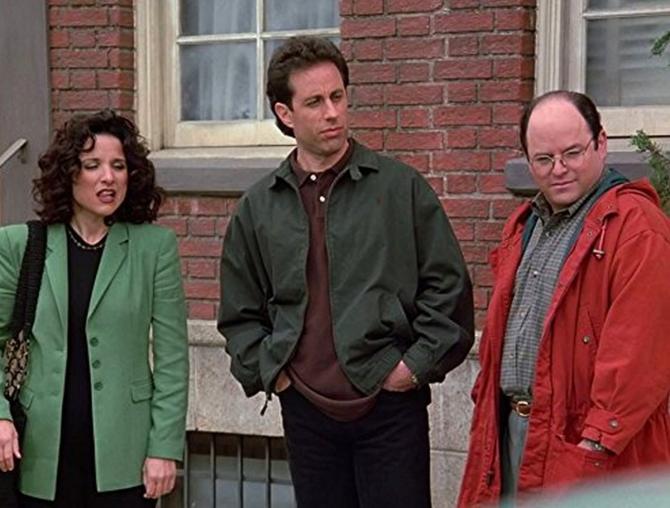
In any Seinfeld episode an inordinate amount of time is spent on the search for the right word, on quibbling about turns-of-phrase and which phrase would best fit a particular state of affairs.
Is someone who abstains from alcohol on the wagon or is he off the wagon?
Jerry: Isn't bunk bad? George: No, something is bunk and then you debunk it.
For an American sitcom, Jerry and George do clash pretty frequently over linguistic usage.
In The Marine Biologist, when George drives himself to an intense pitch and talks about a one-on-one encounter with a whale, he proclaims, 'I could see directly into the eye of the great fish!'and Jerry has the nerve to correct his friend's taxonomical in-exactitude on the instant. 'Mammal', the humourist reminds the soliloquist.
I cannot think of another television show that has had so many characters who glory in the very act of speaking.
Where else could a lawyer like Jackie Chiles, with a penchant for expanding basic arguments into a series of cascading adjectives ('Outrageous, Egregious, Preposterous!'), have set up shop?
Where but in Seinfeld could you meet a catalogue retailer like J. Peterman, who sounds the registers of Shakespeare, Milton, and the King James Bible, all so that can keep his mouldering merchandise moving?
Who can forget that two-scene dynamo, Mr. Bookman of the New York Public Library, who volleys insults with the urgency of a lieutenant broadcasting radio messages over shortwave?
Michael Richards' Kramer spends nine whole seasons flashing by like a fever dream; and the one time you see him pinned down is when an old couple studies his portrait and has an exchange that can only be limned as 'every modern art lover's composite nightmare.'
Julia Louis-Dreyfus' talents as a physical comedienne is never on better display than when she's freely tweaking the rules of syllables, or when she's taking a regular piece of dialogue and inserting into it a plop or a plunk, or when she's creating a chant out of the words 'Putumayo' and 'Cinco De Mayo' and then dancing around like a Mayan on fire.
Of course, no character on the show suffers as severely from verbal incontinence as Newman.
It is suggested that Newman is a beat poet turned postman, and his routines about the Post Office are incredibly original takes on bureaucracy as a place of intrigue and almost paranormal malice.
In short, logorrhoea is general all over Seinfeld. It is so widespread that the defiantly taciturn David Puddy (a priapic freak, whose complete range of responses can be boiled down to that golden utterance: 'Yeah that's right!') cannot help but assume a unique place on the show.
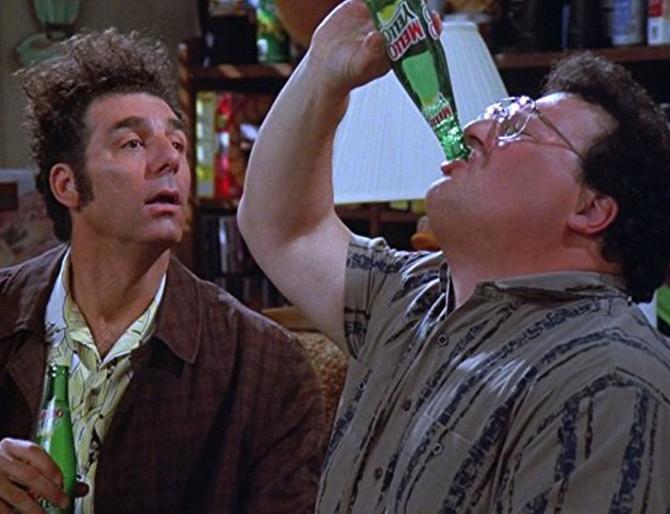
Seinfeld's love of language carries on like an irrepressible footnote to its narrative demands. And in much the same way, the different shades of the Seinfeldian humour discussed here are principles of composition around which practically every episode has been constructed.
A devoted Seinfeld fan at least unconsciously identifies with these principles of composition -- a fan like that would have the good sense to leave randomly mouthed slogans such as 'A Show about Nothing' to the careless perusal of recent converts.
The pride of the devoted Seinfeld fan is linked to his knowledge that the creators of his favourite sitcom are at once first-rate students of the sitcom form as well as its chief saboteurs.
The pride of the devoted Seinfeld fan is that he happens to love a show that doesn't take his love for granted, so that even on repeat viewings he is never really sure what directions an episode might take.
An absence of security, the stripping away of psychic protections, sensations that come upon you often while you are watching the show, were also the ones that drove Larry David to continue writing it.
The 1980s wasn't a memorable decade for Larry David. He would walk out on the audience for not responding to his brand of stand-up, was unable to hack it as a performer on ABC's Fridays and then as a writer on Saturday Night Live.
By the end of Seinfeld's seventh season, however, he was his country's foremost example of someone with an avant-garde bent making it big in the mainstream.
The network was finally in agreement with Larry David's sensibility, and so was America.
But it was all too secure, maybe even easy. If he was frustrated about his lack of clout in the frigid months of 1989, absolute clout that was his by the spring of 1996 left Larry feeling rudderless.
He was an oppositional artist, still; the only problem was, there was no opposition to speak of.
So, with the drums of acclaim beating at their loudest, Larry David parted company with Seinfeld.
The team that wrote Seasons 8 and 9 wouldn't budge from the Larry David Code of Artistic Morality: They took as their inspiration instances from their own lives when they had behaved badly, entertained impure thoughts, searched for quick fixes.
Then Larry came back to minister the last hurrah, a two-parter that should easily make the grade as television's most sardonic goodbye.
There's a general consensus that the finale of Seinfeld was a disappointment. It ought not to surprise anybody that Larry David is very proud of the finale.
Feature Presentation: Rajesh Alva/Rediff.com










